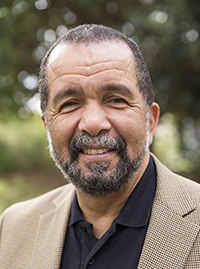Born at SF State: College of Ethnic Studies celebrates 45th year
Ethnic studies, both the academic discipline and the namesake college at San Francisco State University, turns 45 this year. In 1969, following a five-month student-led strike, the longest in U.S. history, SF State became the first university to introduce ethnic studies into its curriculum. While hundreds of universities have since done the same, SF State still has the only multi-ethnic, multidisciplinary College of Ethnic Studies in the nation.

Dean Kenneth Monteiro
In advance of the college's anniversary celebration on Oct. 26, Dean Kenneth Monteiro, who has been head of the College of Ethnic Studies since 2006, discussed the continued relevance of ethnic studies, the uniqueness of SF State's program and the college's newest initiatives.
What is the significance of ethnic studies as a discipline?
People always say they want diversity, but nobody asks "What kind of diversity and for what reason?" Ethnic studies isn't just asking about diversity for diversity’s sake; ethnic studies begins with the fact that diversity is and always has been, and we need to ask how we deal with the diversity of humanity in a just manner. From there, we ask about equity and inclusion of all of our lives in the narrative of the world, and how that plays out in current stratification and struggles for equality.
When you teach U.S. history from any perspective, you teach the Revolutionary War. Why? It was a struggle for liberation by some Americans, and it shaped the nation. When you teach the Civil War, it's a struggle about important differences in values. You are talking about the struggles of a particular portion of America. In ethnic studies, we look at a range of struggles and achievements that are not historically represented in the traditional texts. Bottom line, everyone has the right to know their intellectual and cultural contributions, and all of us would be better thinkers if we knew something about someone else's experiences.
How and to what extent has the college innovated since its creation?
In 1968, modern ethnic studies was born. Most historically traditional fields in the University are 100 or more years older. Yet they are usually not asked this question.
Still, it's reasonable to ask what we've done in the past 45 years. We have expanded Ethnic Studies to include a full liberal-arts breadth, from the arts, humanities and social sciences to the health sciences. In addition, we do not only provide disciplinary studies in Ethnic Studies, but also we integrate intellectual traditions across disciplines. Innovation is greatly enhanced in interdisciplinary environments. We now have four bachelor's degrees, five minor degrees, two master's degrees and a nationally recognized research center, the César Chávez Institute. We serve about 6,000 students a year across over 150 course offerings.
We have helped to create community-based initiatives as well. For example, one of our faculty and some of his students founded a health clinic in the Mission District out of work from one of his classes.
After 45 years, why do you think there are not more ethnic-studies programs like SF State's?
The question is not "Why aren't there more ethnic studies programs?" It's "Why haven't most universities changed enough to open their minds to ethnic studies?" Even SF State had to be closed by the student strike for half a year before it would concede to creating Ethnic Studies. With a great deal of work, the College of Ethnic Studies and its colleagues across campus have slowly but substantively produced cooperation that has allowed it to grow here. Nationally, many universities have either ignored ethnic studies or in some cases have been outright antagonistic to it.
What are some new initiatives at the college?
On the curricular level, the biggest new initiative is the dual-degree program. Ethnic Studies, working with colleagues across the University, has rewritten the curriculum such that with 120 units, you can get an Ethnic Studies degree plus any other degree on campus -- and you can do it without needing to stay an extra semester or two. So if you are in engineering, adding our major can also count for your required general-education classes, creating an efficiency while offering a useful additional value to your education. This allows a student to offer a future employer both demographic and intellectual diversity. We are also launching a graduate certificate program in Ethnic Studies designed for professionals who are working in various communities: teachers, social workers, public officials. In addition, we are designing with colleagues across campus a single-subject emphasis in social science for secondary-education teachers.
You said that 6,000 students take Ethnic Studies courses each year. Why do you think students are attracted to the discipline?
Students come to university to expand their knowledge of the world. They get a taste of what we are doing and say, "I can't believe that I've been in school for 12 years and I've never been told that California is named after Calafia, a mystical African goddess that comes out of a Latino tradition." When you are 17 or 18, you think you know a lot, and then you realize that the world is not just what you've learned. This reopens your imagination. Then students learn more, and they realize that knowing more has practical implications for their future success as an employee, entrepreneur, activist or public leader.
The College of Ethnic Studies will hold its 45th anniversary celebration on Sunday, Oct. 26, from 12 to 3 p.m. at the Seven Hills Conference Center on campus. General-admission tickets are $45, faculty/staff tickets are $35 and student tickets are $25.